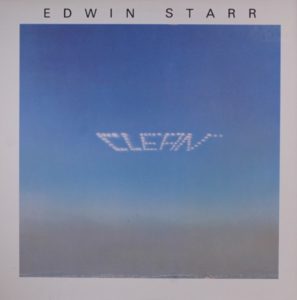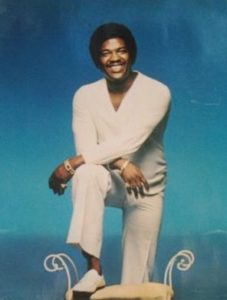I’m not a big soul fan but there are individual soul songs I find magnificent.
“War” (1970) by Edwin Starr in one of them.
Starr’s career had its highs and lows.
The soul ground had changed in the 70s as it morphed into disco, and depending on where one stood before hand it became either pop or street funk in its groove.
Of course there were many shades in between.
Whether the old black soul dudes went along willingly to the disco dancefloor or had to be dragged into it, once committed, it kept them in the green stuff (the old white soul guys who flirted with disco had fewer returns, perhaps not surprisingly).
Wikipedia: "Charles Edwin Hatcher was born in Nashville, Tennessee, in 1942. He and his cousins, soul singers Roger and Willie Hatcher, moved to Cleveland, Ohio, where they were raised … In 1957, Starr formed a doo-wop group, the Future Tones, and began his singing career. Starr lived in Detroit, Michigan, in the 1960s and recorded at first for the small Ric-Tic label, part of the Golden World recording company, and later for Motown Records (under the Gordy Records imprint), after the latter absorbed Ric-Tic in 1968 … The song which launched his career was "Agent Double-O-Soul" (1965), a reference to the James Bond films popular at the time … Other early hits included "Headline News", "Back Street" and "S.O.S. (Stop Her on Sight)". While at Ric-Tic, he wrote the song, "Oh, How Happy", a #12 Billboard Hot 100 hit in 1966 for The Shades of Blue (he would go on to release a version of the song with Blinky in 1969) and sang lead for the Holidays on their #12 R&B hit, "I'll Love You Forever". At Motown he recorded a string of singles before enjoying an international success with "25 Miles", which he co-wrote with producers Johnny Bristol and Harvey Fuqua. It peaked at #6 in both the Hot 100 and R&B Charts in 1969 … It was when Motown's Berry Gordy became frustrated with smaller labels like Ric-Tic stealing some of the success of his company that he bought out the label. Many of Starr's Ric-Tic songs (subsequently owned by Motown) like "Back Street" and "Headline News" became favored Northern Soul classics. His early Ric-Tic hit "Stop Her On Sight (S.O.S.)" was reissued in Britain (with "Headline News" as its B-side) in 1968, and it performed better than the original release on the UK Chart, surpassing the original #35 and peaking at #11. His 1970 song "Time" also helped to establish him as a prominent artist on the Northern Soul scene … The biggest hit of Starr's career, which cemented his reputation, was the Vietnam War protest song "War" (1970). Starr's intense vocals transformed a Temptations album track into a number one chart success, which spent three weeks in the top position on the U.S. Billboard charts, an anthem for the antiwar movement and a cultural milestone that continues to resound in movie soundtracks and hip hop music samples. It sold over three million copies, and was awarded a gold disc. "War" appeared on both of Starr's War & Peace album and its follow-up, Involved, produced by Norman Whitfield. https://en.wikipedia.org/wiki/Edwin_Starrcheescake
During the mid-70s, like many other soul and R&B vocalists, Starr hadn't gotten fully comfortable with the big, busy, dance tracks, devoid of a message. After all he had moved away from the dance based soul of the 60s and now was expected to return to it. A different look with different shoes and different moves but still the same dance.
The O’Jays, one of the greatest of soul acts, were in the same boat. Their funk soul with a message sound was popular in the early to mid-70s but as the decade progressed the public wanted more beats and less politics. The crisis, doubt and unrest of the early-70s had given way to good times and drug fuelled hedonism. It was occurring across mainstream radio friendly music. Generally, people were tired of hearing about the troubles and wanted to dance their problems away. And, that desire tied in with the outlook of the music establishment. The good times and hedonism, reflected the life of the old, those still popular, popstars, now secure in their wealth, so that's what they sang about. The late 70s mainstream, with a few exceptions, Springsteen making statements, Dylan turning to God (a statement in itself) and a few others, was the domain of the dance beat and pop for pops sake … Andy Gibb, (the new) Rod Stewart, K.C and the Sunshine Band, Abba, The Bee Gees, Commodores, Bonnie Tyler, Meatloaf, Donna Summer, Village People, The Jacksons. (the new dancy) Dr Hook, (a beat laden) Rolling Stones, Wings. Elton John, Billy Joel etc etc (of course, punk and the new wave were bubbling under and about to addressed the imbalance)
If Starr wanted to remain viable he needed to transition back to dance based music.
He did.
He didn’t completely leave behind the message in his recorded music, despite what the public were looking for, but he certainly subsumed the message deep in the music, so the album title is quite apt.
This album helped ease the transition from message soul and funk to disco soul and funk.
The album is full of funky pure 70s soul in many of its forms (R&B, disco, balladry, funk) with Starr's voice as passionate, expressive and emotional as always, and, he ends up embracing disco convincingly.
Starr wasn’t one of the smooth soul singers (who slipped into disco easily) nor, exclusively, one of the soul shouters like James Brown but he bridges the two styles. Here he has combined his voice with some soft and hard disco funk beats to create a nice showcase for both sides.
Granted, a little of this goes a long way on me and the upbeat numbers resonate more than the ballads but this is in your face and good for the (dancing) feet also.
Producer by Edwin Starr (tracks: A1, A3, B4) and Lamont Dozier (tracks: A2, B1 to B3). All songs by Edwin Starr unless noted otherwise.
Tracks (best in italics)
Side One
- I'm So Into You – smooth disco funk with some horns that date from an earlier time. Nice but not distinctive.
- Jealous – (Lamont Dozier – Edwin Starr) – even smoother and sexier …
- Contact – (Robert Dickerson – Arthur Pullam – Edwin Starr) – trivial but with some undeniable dance beats (over seven and half minutes) which would have made it a dance floor favourite. And you can playfully booty bump and grind with any number of strangers on the dance floor (without being charged with assault) https://en.wikipedia.org/wiki/Contact_(Edwin_Starr_song)
Side Two
- Storm Clouds On The Way – the "storm clouds" seem to be personal relationship ones not societal ones though there is some intentional ambiguity. Catchy.
- Don't Waste Your Time – a big mid tempo soul ballad
- Music Brings Out The Beast In Me – hmmmmm, not on this song it doesn't (you knew that was coming).
- Working Song – finally, a glorious song. It's a little "old school" (ie: early 70s) with the horns and things but it has been updated for the late 70s. The beat is there, a message is there, and it thumps and pumps with Edwin in great voice. It is a statement on relationships but its attitude and strident nature wouldn't make it popular in current white ribbon times.
And …
Like I said a little goes a long way but there some magnificent song here … tape a couple and sell.
Chart Action
US
Singles
1979 Contact #1 Disco US Charts, #13R&B US, #65 Pop US
Album
1978 #80 US, #22 R&B
England
Singles
1979 Contact #6 UK
Album
—
Sounds
Contact
https://www.youtube.com/watch?v=lfvYXZCIulU
live 2003
https://www.youtube.com/watch?v=IRTdbEVjZ38
Storm Clouds On The Way
https://www.youtube.com/watch?v=XjMgiJdNAxo
Music Brings Out The Beast In Me
https://www.youtube.com/watch?v=oqgXyUUAY5U
Working Song
mp3 attached
Others
https://www.youtube.com/watch?v=BW0AudMnw6g
https://www.youtube.com/watch?v=6g-lhdlWj2c
with Bruce Springsteen
https://www.youtube.com/watch?v=w7GBMX0rTEc
Review
https://www.allmusic.com/album/clean-mw0000860972
https://www.robertchristgau.com/get_artist.php?name=Edwin+Starr
Bio
https://en.wikipedia.org/wiki/Edwin_Starr
https://www.allmusic.com/artist/edwin-starr-mn0000046727/biography
http://www.bbc.com/news/uk-england-nottinghamshire-23944922
Website
Trivia
- In 1983 Starr moved to England and settled in the West Midlands where he got regular work on the Northers soul scene. “During the next two decades he became an established part of the British soul music and show business worlds. He was a favourite of the northern soul dance scene, being voted number one in Blues & Soul magazine's northern soul poll. He gave 50 performances last year, touring with Martha Reeves (of Martha and the Vandellas) in the Motown nostalgia show Dancing in the Streets”. https://www.theguardian.com/news/2003/apr/04/guardianobituaries.politics
- He died in Chilwell, on the outskirts of Nottingham, England in 2003.
From the back cover:


